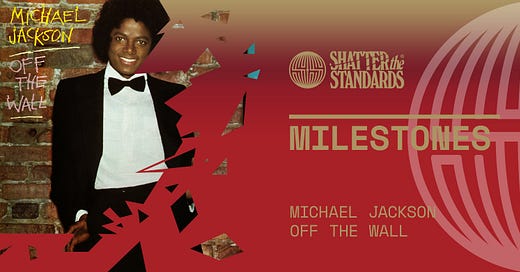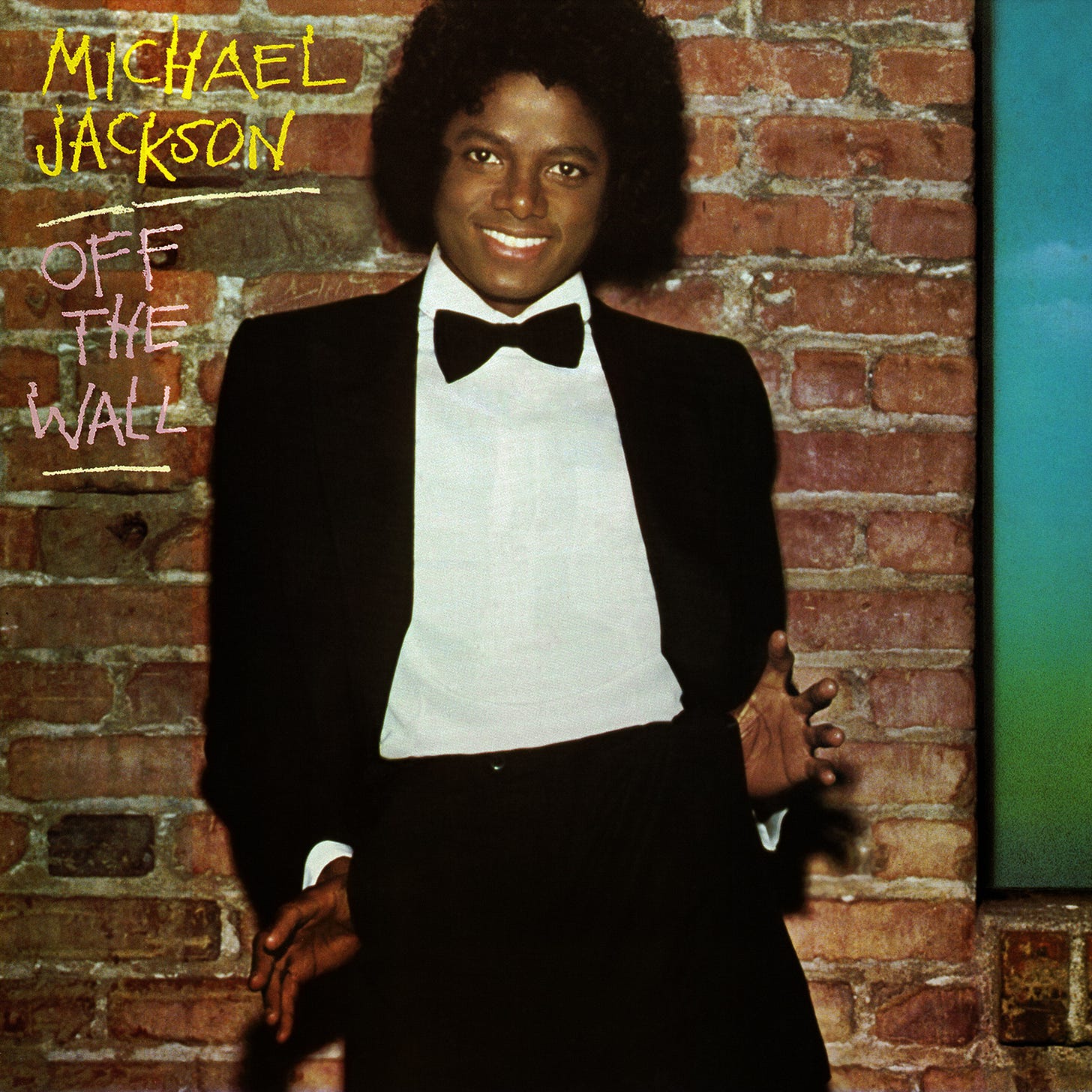Milestones: Off the Wall by Michael Jackson
While Michael Jackson's career would soar to even greater heights in the 1980s, it's the carefree spirit of 'Off the Wall' that sets the tone for what the next chapter of his career would be.
Though Michael was all smiles on “The Jacksons,” he later claimed that he “hated every minute” of it. In the summer of 1976, a variety show called “The Jacksons” debuted on CBS. The program came about during a relatively fallow period for the showbiz brood after the Jackson 5 ignited nationwide fervor with hits like “ABC” and “I’ll Be There” but before Michael Jackson set out for solo superstardom.
Raised in the limelight by an infamously strict father, Michael was painfully self-conscious, worried that he might never be able to shake his child stardom. During the show’s year-long run, he was smack in the middle of gangly teenagedom, acne and all. He didn’t want to merely cling to his family’s fading notoriety. He wanted to break away from it completely.
Their future success seemed in doubt, and the show—with its glaring lights, sparkling costumes, and rampant cheesiness—was a Vegas-style extravaganza that played to well-worn pleasures. One recurring segment called “On the Wall” saw Michael inviting various guest hosts to sign a fake brick facade and do a little dance before everyone eventually ended up in a frozen ta-dah! pose.
Michael Jackson’s transformation into a global icon was no accident. At the tender age of 21, his album Off the Wall became the catalyst for his metamorphosis, allowing him to showcase the fruits of his extensive research and dedication. From his early days in the Motown ecosystem, Jackson absorbed wisdom from legends like Diana Ross, Marvin Gaye, and the Temptations. He scrutinized the movements of James Brown, Sammy Davis Jr., and Fred Astaire, whether on stage, in films, or on television. Despite his youth, he revered musical giants such as Irving Berlin, George Gershwin, and Duke Ellington.
This commitment to learning was evident in a note Jackson penned to himself on November 6, 1979, as Off the Wall began its ascent. His self-proclamation was so audacious it might have made even Ye feel humble. “I aim to become an extraordinary performer who will astound the world,” he declared. “I’ll abstain from interviews. My goal is to be mystifying, meticulous, studious, and masterful… I intend to examine the entire entertainment industry and elevate it beyond the accomplishments of past greats.” Jackson’s aspirations were twofold: he yearned to be perceived as magical, defying expectations and reality, while simultaneously recognizing that such exceptional skills required relentless effort. He understood that true excellence demanded unwavering dedication.
Although he had released four solo albums in his early career, it was Off the Wall that truly allowed Jackson to flex his artistic muscles. This album represented the culmination of his years of observation and practice, transforming him into a wholly new entity. “MJ will be my new moniker,” he wrote. “I desire a complete reinvention—a new persona, a fresh appearance. People should disassociate me from the child who sang ‘ABC’ and ‘I Want You Back.’”
Jackson’s words proved to be remarkably prophetic, foreshadowing his eventual rise to unparalleled stardom. Off the Wall indeed marked the beginning of his liberation, a sonic representation of his evolution into the King of Pop. It was clear that Jackson knew precisely what he was doing—crafting a new identity that would forever change the landscape of popular music.
The enduring appeal of Off the Wall lies in its unbridled exuberance, offering listeners a glimpse into the perpetually youthful fantasy realm Michael Jackson yearned for—a universe largely devoid of consequences or mortality. This sentiment is echoed in a recent Spike Lee documentary, Michael Jackson’s Journey from Motown to Off the Wall, included in a CD/DVD re-release. The film, partially produced by Jackson’s estate executors, barely touches on the artist’s life post-Off the Wall, instead focusing on his earlier incarnations.
The documentary features tributes from Jackson’s family members and associates, alongside contemporary stars like Abel Tesfaye of The Weeknd, Questlove, and Pharrell. Tesfaye confesses in the film, “Off the Wall was the one that made me feel like I could sing,” underscoring the album’s lasting impact on future generations of musicians.
Off the Wall emerged during a period of optimism. Jackson’s musical evolution and physical changes appeared organic—joyful expressions of the African American experience. Disco was at its zenith, dismantling racial barriers and radio format restrictions while promising a utopian escape on the dancefloor. For Jackson, hailing from the segregated, blue-collar city of Gary, Indiana, his accomplishments and acceptance symbolized a hopeful vision of America’s future.
However, 1979 also marked the beginning of challenges. The quasi-racist “disco sucks” backlash began to take hold, and Jackson underwent his first rhinoplasty, reducing the width of his nostrils. While the 1980s would bring even greater success for Jackson, his astronomical rise sometimes catered to white preferences—in appearance and sound—in ways that could be perceived as labored, calculated, and melancholic.
Disco’s overwhelming popularity in the late 1970s represented a moment of idealism. Yet, the landscape began to shift as the decade drew to a close. Despite these impending changes, Off the Wall remains a testament to a more carefree era in Jackson’s career, before the weight of stardom and public scrutiny fully descended upon him.
Revisiting Off the Wall allows us to momentarily inhabit this idealistic period, free from the complexities that would later define Jackson’s career. For 41 minutes, listeners can immerse themselves in the pure joy and artistry of a young Michael Jackson, poised on the brink of unparalleled stardom but not yet burdened by its consequences.
The album, which has now sold an impressive 30 million copies worldwide, was a groundbreaking fusion of disco’s infectious energy and innovative musical complexity. Released as the disco era was waning, the record managed to capture the essence of the genre while simultaneously pushing new ground.
The album’s producer, Quincy Jones, a seasoned musical virtuoso who had collaborated with jazz legends like Dizzy Gillespie, Frank Sinatra, and Count Basie, played a crucial role in shaping the album’s sound. “Our underlying strategy was to transcend disco,” Jones once remarked. “I respected disco, don’t misunderstand me. I just felt it had reached its peak.” Together, Jones and Jackson crafted a collection of songs that were deceptively intricate yet beautifully accessible.
The opening track, “Don’t Stop ’Til You Get Enough,” exemplifies this approach. It was Jackson’s first solo composition and became one of four chart-topping hits from the album. While ostensibly a tribute to romantic passion—a subject Jackson had limited personal experience with at the time—the song’s nuanced arrangements and Jackson’s instinctively rhythmic vocals hint at a deeper, almost ineffable understanding.
Many of the album’s tracks adhere to disco’s primary essence: leave your troubles behind and surrender to the dance. Jackson himself had experienced this euphoria while filming The Wiz in New York City in 1978. During his downtime, he frequented Studio 54, rubbing elbows with celebrities like Woody Allen, Liza Minnelli, Steven Tyler, and Jane Fonda. Although Jackson reportedly abstained from the club’s infamous excesses of drugs and sex, he keenly observed the scene, particularly noting which songs elicited the strongest reactions from the dance floor.
Drawing inspiration from these experiences, Jackson and Jones created their disco anthems. However, they elevated the genre by incorporating lush, orchestral arrangements that blended sophisticated layers of strings, horns, and syncopation while maintaining a solid funk foundation. This innovative approach is evident throughout the album, including on “Working Day and Night,” another Jackson-penned track. While the lyrics subtly allude to the detrimental effects of Jackson’s workaholic upbringing and a growing sense of paranoia, the song’s bouncing guitar riffs and jubilant brass section keep the groove irresistibly smooth.
With Off the Wall, Jackson showcases his artistic evolution, blending innovative musical experiments with raw emotional performances. The title track foreshadows the eccentricities of “Thriller” with its eerie 15-second intro of ominous laughter and ethereal instrumentation. Another standout, “I Can’t Help It,” co-penned by Stevie Wonder and initially destined for his Songs in the Key of Life album, melds smooth jazz with shimmering synthesizers. This track’s influence on Pharrell’s unconventional funk style is undeniable.
Perhaps the most poignant moment on the album comes with “She’s Out of My Life,” a ballad that risks disrupting the album’s flow with its beatless melodrama. However, it emerges as a genre classic, featuring Jackson’s audibly cracking voice and genuine tears by the song’s end. This unguarded display of emotion from the notorious perfectionist is handled with understated elegance by producer Quincy Jones. As Questlove humorously notes in the documentary, “A less skilled producer would have exploited all that drama excessively. Believe me, if Puffy were producing ‘She’s Out of My Life,’ he’d have… Kleenex sponsoring the tour.”
This quip resonates deeply when considering Jackson’s background. Raised by his father to be a commodity, with idols often found on the TV screen, Jackson understood his commercialization enough to want to reject it. Yet simultaneously, he aspired to sell countless albums, unify the world, and become the ultimate entertainer. These conflicting desires created numerous contradictions, and in retrospect, Jackson’s subsequent challenges almost seem unavoidable.
However, Off the Wall captures that rare moment of equilibrium, when Michael Jackson’s innocence and purity still appeared sacred rather than stunted or distorted. His tearful performance on the record was a manifestation of living his art, delivering an authentic performance to his audience. The album is a product of a young man grappling with complex aspirations. In hindsight, the contradictions inherent in Jackson’s quest for stardom become apparent. Yet, at a time when Jackson’s artistry and commercial appeal aligned perfectly, Off the Wall results in a work that feels both genuine and groundbreaking.
Masterpiece (★★★★★)




